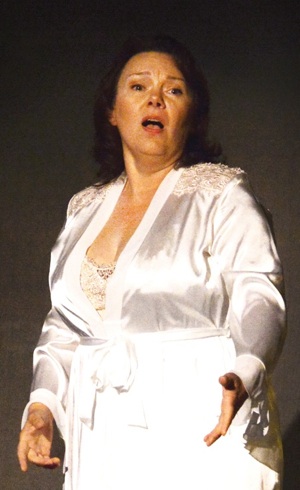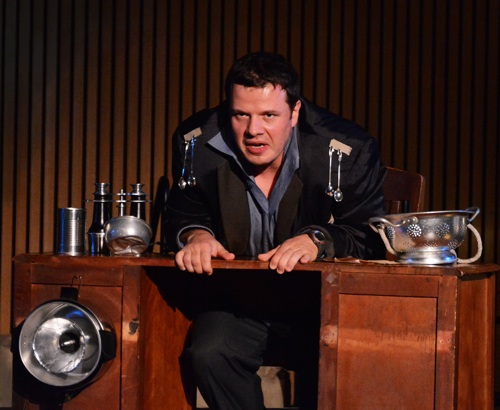Chamber opera explores the scars of survival in moving program…
Last Monday in Walnut Creek, a star-studded cast of seven singers and 13 musicians joined together to honor Yom HaShoah, the Day of Remembrance for the six million Jews who died in Hitler’s concentration camps.
Festival Opera staged two chamber operas on April 28 at the Unitarian Universalist Church, one deeply felt and one darkly humorous. In Another Sunrise, composer Jake Heggie explored the tattered veils of memory. This formidable composer, known for his operas Dead Man Walking and Moby Dick, worked with librettist Gene Scheer to explore a long moment in the life of Jewish freedom fighter and Auschwitz survivor, Krystyna Zywulska.
 The thirty-minute operetta was a star vehicle for soprano Marie Plette, who was a force of nature both vocally and emotionally. This meditation on horror rubbed our senses raw, as Plette tried to find words that could describe the unspeakable. Dictating her memoirs into an old tape recorder, she stutters and stops, keens and vocalizes.
The thirty-minute operetta was a star vehicle for soprano Marie Plette, who was a force of nature both vocally and emotionally. This meditation on horror rubbed our senses raw, as Plette tried to find words that could describe the unspeakable. Dictating her memoirs into an old tape recorder, she stutters and stops, keens and vocalizes.
Piano notes were repeated until we understood that even music could not contain her anger and grief and shame, nor the hard choices of a survivor, and then violin and cello expanded those repeated notes into awkward intervals and simple fourths. Karen Rosenak, an original Earplay member and specialist in contemporary music, performed on piano with Oakland Symphony regulars Diane Maltester on clarinet and Dan Reiter on cello. When Heggie lets the music flower into simple clarinet melodies, we know he is alluding to the weeping laughter of Klezmer. High violin notes from Kathleen Dillon formed an acid element against the cool fabric of clarinet.
Heggie and Scheer describe the dilemma implicit in their work. “Another Sunrise is about the struggle to describe harrowing, unimaginable situations to people who weren’t there. It is also about what it is to survive… to see another sunrise.”
The music cycled from thin high violin to punishingly high vocals, and on to a slow waltz that evolved into darkly energetic exchanges, and back to simple chromatic circles. Soprano and the four instruments alternated verses fluidly, circling the themes through the different timbres. Heggie has a sure hand with vocal writing, with the voice as both its own medium and as one strand in a larger musical accord.
The text, which Scheer took from Zywulska’s own writings, is spare and unsparing. At one point Plette sings of bringing a cup of hot water to a dying friend. Or she remembers a return trip to the concentration camp. “I took my husband on a tour of Auschwitz. Over here are the barracks. And here are the ovens, next to the effects room.”
She had worked in the effects room, stripping women and children of their belongings and cataloging them, before sending them next door where she could hear their screams as they died.
“A survivor is not a hero,” Plette sings bitterly.
…and then explores indomitable spirit.
The second chamber opera left a survivor’s shame behind for manic sarcasm, in The Emperor of Atlantis by composer Viktor Ullman and librettist Peter Kien. Written in Theresienstadt before they were sent to the gas chambers of Auschwitz, this one-hour opera takes caricatures to play out a drama. Death, appalled by the carnage of the Emperor, decides to go on strike. The effect is that troops can fire on each other, but none can die no matter how they suffer, lingering on in a twilight world of pain that obviously parallels the concentration camps.
The opera ends with a dramatic twist, an ultimatum from Death that he will return with the proviso that the Emperor be his first victim.
Eugene Brancoveanu headed the cast as Emperor, overwhelming the church with his huge and sonorous baritone, but equaled that magnificent voice with acting that was as immediate and madcap as a Marx brother. Staged as it would have been in the concentration camp, Brancoveanu wore a salad bowl for helmet and epaulets of silverware, sometimes peering through two candlesticks as binoculars, or shouting into a runcible spoon for his microphone. And often he would declaim grandly while holding a paintbrush to his upper lip – an Adolph Hitler mustache – or fold and fling paper airplanes with a “rat-tat-tat-tat-tat” along with a child’s glee and megalomania.
Phillip Skinner was a compelling Death with a deep and surprisingly lovely bass. In a duet with Harlequin, he wearily sings, “I used to be someone once,” then vaults into dissonant intervals for “My name is Death.” He was imposing, both vocally and as an actor, and recalled his brilliantly evil Cardinal in a recent Tosca with West Bay Opera.
Harlequin was played with slick physical comedy by tenor Christopher Bengochea, using over-the-top notes and disjointed melodies to reinforce a fragmented personality, and then he transforms in a trice into the role of the lovesick Soldier.
 The cast was rounded out with soprano Rebecca Garcia as a lovely War Maiden, mezzo Valentina Osinski as a convincingly acted Drummer Girl and Roberto Perlas Gomez as the Loudspeaker. The excellent duos or trios were equal parts the magic of Mozart and the swank of a honky-tonk, and the final chorus was sumptuous. There, satisfying vocal chords took turns with downward violin phrases, a High Mass that celebrates Death in place of God.
The cast was rounded out with soprano Rebecca Garcia as a lovely War Maiden, mezzo Valentina Osinski as a convincingly acted Drummer Girl and Roberto Perlas Gomez as the Loudspeaker. The excellent duos or trios were equal parts the magic of Mozart and the swank of a honky-tonk, and the final chorus was sumptuous. There, satisfying vocal chords took turns with downward violin phrases, a High Mass that celebrates Death in place of God.
Musically, Ullman evokes a flurry of styles, from German beer hall to Kurt Weill’s heady sarcasm, with exaggerated phrases that tended to expire rather than resolve. The chamber orchestra was enlarged with regulars of the “Freeway Philharmonic,” excellent representatives of local orchestras like the Festival Opera Orchestra, California Symphony, Oakland Symphony and Left Coast Chamber Orchestra. They blended skillfully in the difficult score under the tight direction of Matilda Hofman, conductor of the Diablo Symphony.
After years of stringent budgets, Festival Opera is going through its own sea change, and now plans to present one full-fledged opera and one chamber opera each season. If they are as potent as this program, the future of the company ought to be assured.
—Adam Broner
Photo, top, of Marie Plette as Krystyna Zywulska; photo, bottom, of Eugene Brancoveanu as The Emperor; both photos by Richard Brundage.
